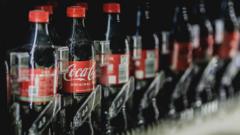With aluminum prices poised to spike after the imposition of a 25% import tax on steel and aluminum, Coca-Cola is bracing for potential impacts on its product packaging strategy. Quincey mentioned that should aluminum prices increase, the company could pivot towards using more PET plastic bottles, although this decision may fall short of sustainability goals. Following the tariff announcement, Coca-Cola adjusted its target for using recycled materials from 50% by 2030 to a more modest 35-40% by 2035. Environmental advocates have criticized Coca-Cola in recent years for its substantial plastic waste, dubbing it the "top global plastic polluter."
Despite the potential increase in costs for aluminum cans, Quincey attempts to downplay the tariffs' impact on Coca-Cola’s overall operations, emphasizing that packaging costs represent a small fraction of the company's expenses. Historically, Coca-Cola has favored aluminum containers to enhance its environmental marketing profile. The U.S. relies heavily on imported aluminum, which now faces a 25% tariff, likely driving prices higher for canned beverages.
Following past tariff implementations in 2018, many can manufacturers successfully sought exemptions. However, Trump's current stance indicates that there will be no exemptions for particular products or countries this time around. Adding to the environmental concerns, Trump also recently nullified an initiative aimed at reducing plastic usage, further contributing to the ongoing discourse on plastic pollution, a topic that the previous administration had prioritized.
Despite the potential increase in costs for aluminum cans, Quincey attempts to downplay the tariffs' impact on Coca-Cola’s overall operations, emphasizing that packaging costs represent a small fraction of the company's expenses. Historically, Coca-Cola has favored aluminum containers to enhance its environmental marketing profile. The U.S. relies heavily on imported aluminum, which now faces a 25% tariff, likely driving prices higher for canned beverages.
Following past tariff implementations in 2018, many can manufacturers successfully sought exemptions. However, Trump's current stance indicates that there will be no exemptions for particular products or countries this time around. Adding to the environmental concerns, Trump also recently nullified an initiative aimed at reducing plastic usage, further contributing to the ongoing discourse on plastic pollution, a topic that the previous administration had prioritized.


















